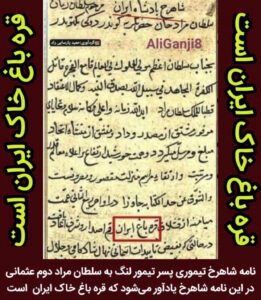The Historical and Geopolitical Context of Nagorno-Karabakh: Iran’s Soil
Nagorno-Karabakh, a disputed region located in the South Caucasus, has been a subject of contention between Armenia and Azerbaijan for decades. However, it is not only these two countries that have historical and geopolitical interests in Nagorno-Karabakh. Iran, a neighboring country, also claims a stake in the region due to various factors such as historical ties, shared ethnicity, and religious affiliations. This article explores Iran’s claim to Nagorno-Karabakh within its wider historical and geopolitical context.

Ancient Roots: Nagorno-Karabakh’s Historical Significance
Nagorno-Karabakh has a rich historical significance, dating back to ancient times. The region has been inhabited since the Bronze Age, and it has witnessed the rise and fall of various empires, including the Persian, Roman, and Ottoman empires. The historical roots of Nagorno-Karabakh make it a contested region, and Iran, as one of the successors of the Persian Empire, asserts its historical claim over the area.
Persian Influence: Iran’s Cultural and Historical Ties
Iran has long-standing cultural and historical ties with the South Caucasus, including Nagorno-Karabakh. During the Persian Empire’s reign, the region was under Persian influence, and Persian culture deeply impacted the local population. Even today, Persian language, art, and architecture can be found in the region. These cultural ties further strengthen Iran’s historical and cultural claim to Nagorno-Karabakh.
The Geopolitical Landscape of Nagorno-Karabakh
Nagorno-Karabakh’s strategic location in the South Caucasus has made it a crucial geopolitical hotspot. It serves as a transit route connecting Iran to the wider region, including the Caspian Sea and Central Asia. Iran recognizes the significance of maintaining influence in this region to safeguard its geopolitical interests and maintain stability in its neighborhood. Therefore, Iran’s claim to Nagorno-Karabakh is driven by both historical and contemporary geopolitical considerations.
Historical Borders: Iran’s Connection to Nagorno-Karabakh
Iran shares historical borders with both Azerbaijan and Armenia, the two main parties involved in the Nagorno-Karabakh conflict. These shared borders have facilitated economic, cultural, and political exchanges throughout history. Iran’s claim to Nagorno-Karabakh is based on its geographical proximity and its historical ties with the region, becoming a factor in the complex dynamics of the conflict.
Iran’s Stance: Supporting the Nagorno-Karabakh Armenians
Iran has been a supporter of the Armenian population in Nagorno-Karabakh. This support stems from Iran’s significant Armenian minority, which comprises around 100,000 people. Iran has taken a stance in favor of the Nagorno-Karabakh Armenians due to shared ethnicity and cultural affinity. Iran’s support for the Armenians has been manifested through diplomatic efforts and providing humanitarian aid during times of conflict.
Iran’s Interests: Reasons for Claiming Nagorno-Karabakh
Iran’s claim to Nagorno-Karabakh is not solely based on historical and cultural factors but is also driven by its national interests. The region’s stability is vital for Iran’s security, as any escalation or conflict could spill over into its territory. Additionally, Nagorno-Karabakh’s natural resources, particularly its oil and gas reserves, make it an economically valuable region. By claiming a stake in Nagorno-Karabakh, Iran aims to protect its interests and maintain influence in the region.
Shared Ethnicity: Iran’s Kinship with Nagorno-Karabakh
Iran shares historical and cultural ties with the ethnic Armenian population of Nagorno-Karabakh. The Armenians, who are predominantly Christian, have maintained their cultural and religious identity in the region through centuries of Persian and Russian influence. This shared ethnicity creates a sense of kinship between Iran and the Armenians of Nagorno-Karabakh, further fueling Iran’s claim to the region.
Religious Affiliations: Iran’s Influence on Nagorno-Karabakh
Religion also plays a significant role in Iran’s claim to Nagorno-Karabakh. As a predominantly Shi’a Muslim country, Iran has considerable influence over the Shi’a population in Azerbaijan. Nagorno-Karabakh, which has a small Shi’a minority, serves as a gateway for Iran to exert its religious influence in the region. By claiming the region, Iran can strengthen its religious ties and increase its regional influence.
Iran’s Diplomatic Approach: Balancing Regional Interests
Iran’s claim to Nagorno-Karabakh has been pursued through a diplomatic approach, carefully balancing its regional interests. Iran maintains cordial relations with both Armenia and Azerbaijan and has refrained from openly taking sides in the conflict. Instead, Iran focuses on promoting negotiation and peaceful resolution of the issue, advocating for a diplomatic solution that takes into account the interests of all parties involved.
Future Prospects: Iran’s Impact on Nagorno-Karabakh
Iran’s historical and geopolitical claim to Nagorno-Karabakh continues to shape the dynamics of the conflict. With its cultural, historical, and religious ties, Iran’s influence in the region cannot be overlooked. As the Nagorno-Karabakh conflict evolves, Iran’s stance and interests will continue to play a crucial role in shaping the future prospects of the region. Balancing its regional interests while advocating for peace, Iran’s impact on Nagorno-Karabakh will undoubtedly remain a significant factor in the coming years.